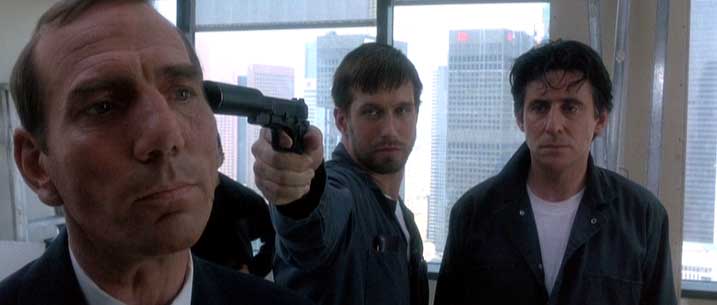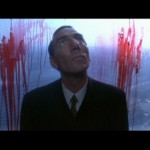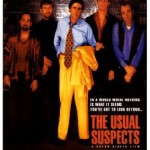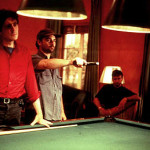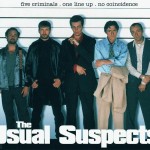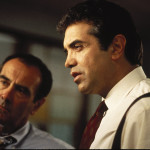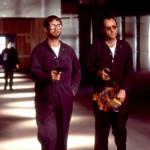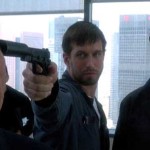So much was written at the time about Bryan Singer and Christopher McQuarrie‘s excellent and twisty thriller The Usual Suspects, and much of it was total tripe. I looked upon claims that it was so complex that people could not follow the plot with total incredulity. There are many many movies with plots more convoluted, but the difference here is that you have to decide who is spinning you a line and what is really going on here.
After all, in real life you do your own editing of what people say, since inevitably there is truth and fiction woven together with an element of historic reinterpretation. So it is in this case: Like Salieri’s story in Amadeus, told retrospectively, short con operator and self-declared “cripple” Roger “Verbal” Kint’s (Oscar-winning Kevin Spacey) tale told to US Customs Agent Dave Kujan (Chazz Palminteri.)
Of course, if you believe Hollywood, cinema audiences allegedly don’t like ambiguity, though the success of The Usual Suspects (the name apparently taken from a line by Claude Rains in Casablanca) and most movies by Christopher Nolan, to name but a few, prove otherwise, though getting it through the Studio system for financing was not easy. From Wikipedia:
McQuarrie wrote nine drafts of his screenplay over five months, until Singer felt that it was ready to shop around to the studios. None was interested except for a European financing company. McQuarrie and Singer had a difficult time getting the film made because of the non-linear story, the large amount of dialogue and the lack of cast attached to the project. Financiers wanted established stars, and offers for the small role of Redfoot (the L.A. fence who hooks up the five protagonists with Koybashi) went out to Christopher Walken, Tommy Lee Jones, Jeff Bridges, Charlie Sheen, James Spader, Al Pacino and Johnny Cash. However, the European money allowed the film’s producers to make offers to actors and assemble a cast. They were only able to offer the actors salaries that were well below their usual pay, but they agreed because of the quality of McQuarrie’s script and the chance to work with each other. That money fell through, however, and Singer used the script and the cast to attract Polygram to pick up the film negative.
But the genius of TUS was to have an unseen and mythical criminal overlord pulling the strings. Keyser Söze dominates the movie, not only by his actions and those acting on his behalf, but by the very uncertainty of his existence and, assuming he does exist, by his identity. As Kint says:
“Who is Keyser Soze? He is supposed to be Turkish. Some say his father was German. Nobody believed he was real. Nobody ever saw him or knew anybody that ever worked directly for him, but to hear Kobayashi tell it, anybody could have worked for Soze. You never knew. That was his power. The greatest trick the Devil ever pulled was convincing the world he didn’t exist. And like that, poof. He’s gone.”
In Kint’s story Söze manipulates the police to get together a band of criminals for a police lineup in New York, which results, via two other crimes, in a raid on behalf of Söze, communicated by his lawyer Kobayashi (the late and much lamented Pete Postlethwaite), with a burning ship in the harbour and 27 corpses, but none of the promised $91m worth of cocaine.
So what is going on, and who do you believe? Kujan believes it is Dean Keaton (Gabriel Byrne) pulling the strings, and refuses to believe Keaton died, in spite of Kint’s assurance that he saw Keaton shot before the ship blew up. Kint also states that other members of the gang (Hockney and McManus, Fenster already having been offed on the orders of Söze) are dead. All that is found is the money, in the back of a van.
Very mysterious, and it is not until the last 2 minutes of the movie that all becomes clear. This is one of the truly great endings in cinematic history. Like The Sixth Sense, Memento and several more endings-with-ad tension built up into this rapport-twist, this is a movie that sticks in the mind with a sense of awe. Almost everyone now knows the twist, but I won’t spoil it in case someone reading this has yet to see the movie.
The success and credibility of this venture is due in no small part to the excellent ensemble cast. Much is about the depth of the partly-improvised dialogue, clues and red herrings included, between Kint and Kujan. Spacey and Palminteri deserve huge credit for the guile and intrigue of the spatial relationship between the two (beginning with Kujan’s statement “Let me get right to the point. I’m smarter than you and I’m gonna find out what I want to know and I’m gonna get it from you whether you like it or not“), but the whole cast have their moments, helped by a slick wisecracking script with some delicate touches of irony. For example:
Stephen Baldwin‘s McManus sings to himself as he lines up a shot:
“Old McDonald had a farm ee i ee i o. And on that farm he shot some guys. Badda boom badda bing bang boom…. 1, 2, 3, 4, 5, 6, 7. Oswald was a fag.”
Kevin Pollak‘s Hockney finds a retort to the interrogators:
Interrogation Cop: I can put you in Queens on the night of the hijacking.
Hockney: Really? I live in Queens. Did you put that together yourself, Einstein? What, do you got a team of monkeys working around the clock on this?
Interrogation Cop: You know what happens if you do another turn in the joint?
Hockney: Fuck your father in the shower and then have a snack? Are you going to charge me dickhead?
Nice interchange between Hockney and Benicio del Toro’s Fenster:
[referring to being strip-searched during his interrogation]
Fenster: I had a finger up my asshole tonight.
Hockney: Is it Friday already?
And Fenster’s own interrogation:
[being interrogated for hijacking a truck]
Fenster: Say who?
Interrogation Cop: McManus. He told us another story altogether.
Fenster: Oh, was that the one about the hooker with the dysentery?
These are all perfectly formed 3D characters in their own right, each with a personality, motives and foibles. They are chosen because together they bond as a team, albeit a team. They have attitude, individually and collectively, and they all want to know what is happening to them and why. Fenster is best of all, virtually incomprehensible but then what he says matters far less than the way he says it. Great fun! Cue Wikipedia again:
About casting, Singer said, “You pick people not for what they are, but what you imagine they can turn into.” To research his role, Spacey met doctors and experts on cerebral palsy and talked with Singer about how it would fit dramatically in the film. They decided that it would affect only one side of his body. According to Byrne, the cast bonded quickly during rehearsals. Del Toro worked with Alan Shaterian to develop Fenster’s distinctive, almost unintelligible speech patterns. According to the actor, the source of his character’s unusual speech patterns came from the realization that “the purpose of my character was to die.” Del Toro told Singer, “It really doesn’t matter what I say so I can go really far out with this and really make it uncomprehensible.”
In a large measure, The Usual Suspects can be seen as a comic strip brought to life, but the elements of serious film-making are there to see. The cinematography and planned shots are lit and lined up beautifully. The introduction piano theme, plus music throughout the movie, are used sparingly but develop the atmosphere to perfection.
So there is a lot to be praised here, quite apart from the deft sleight-of-hand that lead to an inspiring denouement. The script, the acting, the direction are worthy of individual praise, while collectively they do much to entertain.
But the best compliment I can pay TUS is that it bears multiple viewings, and not merely to catch up with the plot details you missed first time around either. The plot, while intricate, is intensely satisfying, whether or not you can work out what is truth and what is fantasy. That process I will leave to you. Even when you know the twist, the qualities of the movie make it worth seeing again, and of how many movies can you say that?

